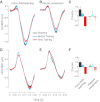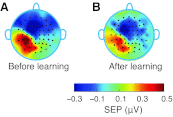Sensorimotor adaptation changes the neural coding of somatosensory stimuli
- PMID: 23343897
- PMCID: PMC3628028
- DOI: 10.1152/jn.00719.2012
Sensorimotor adaptation changes the neural coding of somatosensory stimuli
Abstract
Motor learning is reflected in changes to the brain's functional organization as a result of experience. We show here that these changes are not limited to motor areas of the brain and indeed that motor learning also changes sensory systems. We test for plasticity in sensory systems using somatosensory evoked potentials (SEPs). A robotic device is used to elicit somatosensory inputs by displacing the arm in the direction of applied force during learning. We observe that following learning there are short latency changes to the response in somatosensory areas of the brain that are reliably correlated with the magnitude of motor learning: subjects who learn more show greater changes in SEP magnitude. The effects we observe are tied to motor learning. When the limb is displaced passively, such that subjects experience similar movements but without experiencing learning, no changes in the evoked response are observed. Sensorimotor adaptation thus alters the neural coding of somatosensory stimuli.
Figures





References
-
- Alary F, Doyon B, Loubinoux I, Carel C, Boulanouar K, Ranjeva JP, Celsis P, Chollet F. Event-related potentials elicited by passive movements in humans: characterization, source analysis, and comparison to fMRI. Neuroimage 8: 377–390, 1998 - PubMed
-
- Alary F, Simões C, Jousmäki V, Forss N, Hari R. Cortical activation associated with passive movements of the human index finger: an MEG study. Neuroimage 15: 691–696, 2002 - PubMed
-
- Bernier PM, Burle B, Vidal F, Hasbroucq T, Blouin J. Direct evidence for cortical suppression of somatosensory afferents during visuomotor adaptation. Cereb Cortex 19: 2106–2113, 2009 - PubMed
-
- Bötzel K, Ecker C, Schulze S. Topography and dipole analysis of reafferent electrical brain activity following the Bereitschaftspotential. Exp Brain Res 114: 352–361, 1997 - PubMed
-
- Burdet E, Osu R, Franklin DW, Milner TE, Kawato M. The central nervous system stabilizes unstable dynamics by learning optimal impedance. Nature 414: 446–449, 2001 - PubMed
Publication types
MeSH terms
Grants and funding
LinkOut - more resources
Full Text Sources
Other Literature Sources

